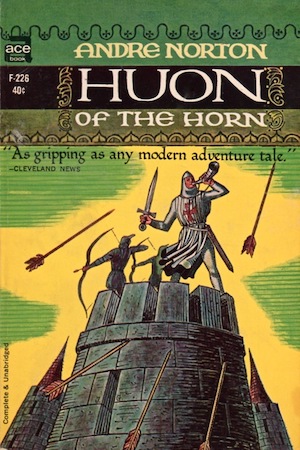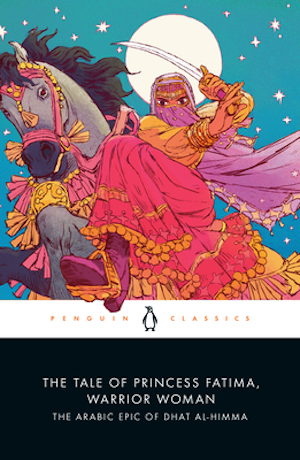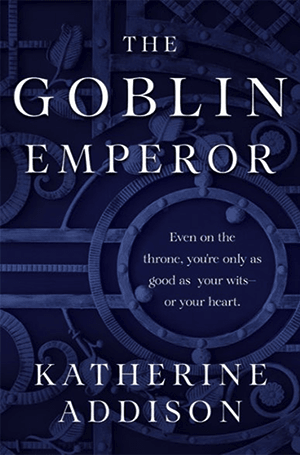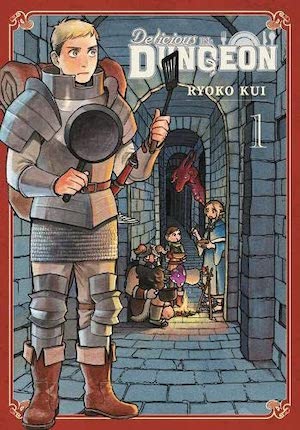It is a rare ruler who really is the state, various Sun King claims to the contrary. Look closer and one often finds that even the most autocratic of autocrats are dependent on functionaries.
I was reminded of this recently by an article on Emperor Ping. Emperor Ping of Han ascended the throne of China in 1 BCE, aged just eight. The ability of a child to rule an empire is open to question. Emperor Ping was fortunate enough to have as his regent Wang Mang, who seems to have been an all-around competent, energetic adviser. Unfortunately, the article discussing Emperor Ping and Wang Mang had some pages missing, so I am not sure what happened after January, 6 CE. Nevertheless, I have no doubt that Wang Mang served Emperor Ping capably until the end of the emperor’s days. [Editor: ahem]
Unsurprisingly, many authors have spotted the utility of having the right adviser in the right position for moving plots along sharpish. Take these five examples.
Amaury from Huon of the Horn by Andre Norton (1951)

In Norton’s historical fantasy, Amaury shapes history. First, Amaury convinces Charlemagne to overlook the past transgressions of Charlemagne’s oldest son Charlot. Amaury then persuades Charlot to assist Amaury in murdering Huon and Gerard, the sons of an old enemy of Amaury’s1.
The assassination doesn’t go well. Neither Huon nor Gerard die. Instead, Charlot is struck down by Huon. One might expect this would end in Huon’s death once Charlemagne discovers who killed his son. Instead, the canny king sends Huon on an epic quest, one from which Huon is unlikely to return.
Modern readers may be struck by three elements of this tale. First, how characters cannot seem to spot even the most obvious lies. Second, the ease with which persons of this era resorted to lethal violence. Third, the pacing: the events described above occur in the first two dozen or so pages of the novel.
‘Uqba from The Tale of Princess Fatima, Warrior Woman, edited and translated by Melanie Magidow (1980/2021)

Although Fatima is a fearsome warrior little interested in domesticity, even she cannot avoid marriage to her disappointing cousin Walid. Walid soon discovers that Fatima has no intention of being a submissive, obedient wife. As she could as easily snip Walid’s head off as she could strike a poppy from its stem, Walid and Fatima are at an impasse.
Enter ꜤUqba, adviser to Walid. His bold suggestions about domestic relations further alienate Fatima from Walid. ꜤUqba then orchestrates Walid’s defection to Christian Byzantium, whose ruler will surely favor Walid… only for Fatima to win the sincere gratitude of Constantinople’s ruler Leo by defeating the invading King of Poland, thus saving Constantinople.
Readers might be surprised that Fatima would intervene on Constantinople’s behalf, what with Byzantium being the regional rival to the late Umayyad and early Abbasid Caliphates. For the most part, with some very notable exceptions, Fatima is quite willing to befriend today the enemy she fought yesterday. The trick is surviving long enough for her to warm to a former opponent.
Archdeacon Goribani from Wizenbeak by Alexis Gilliland (1986)

Senior cleric Goribani plays a vital role in Prince Kahun’s court. Whenever the prince expresses some firmly held belief—such as proclaiming that Kahun’s father King Grathnys is undead, kept upright and mobile only through the dark magic of Kahun’s manifestly evil stepmother Queen Shaia—Goribani agrees with Kahun… or at least keeps doubts to himself.
The short-term effect of Goribani’s support is to enable Kahun’s bold campaign of regicide and civil war. The long-term effect is entirely beneficial to Kahan, in that he is liberated from all concern about dynastic disputes. Goribani is not so fortunate. He is appointed Patriarch after the position is abruptly vacated. He remains entangled in the complex (and violent) politics of the realm.
Readers may wonder how Wizenbeak figures into this. He’s a water wizard whose bold irrigation plan for a heretofore barren region entangles him in the struggle for the throne. He’s not so much a deliberate instigator as a guy just trying to survive his choice of funding.
Setheris Nelar from The Goblin Emperor by Katherine Addison (2014)

For the crime of being a living, half-goblin reminder of an unfortunate political marriage, Emperor Varenechibel the Fourth relegated his son Maia to an isolated manor next to a swamp. To ensure that Maia received an appropriate education, Varenechibel relegated Setheris Nelar as well. The resentful Setheris spent years taking out his displeasure on Maia. Persecuting Maia was perfectly safe, because as long as the emperor was alive, or as long as one of Maia’s older half-brothers survived the emperor, there was no chance that the despised Maia would ever become emperor.
Following the sudden, simultaneous deaths of the emperor and his three older sons, Maia is unexpectedly elevated to the throne. Setheris’ years of abuse finally have their chance to shape Maia’s reign… by providing Maia with an opportunity to demonstrate that he is such a virtuous, noble person that he will not launch a memorable and bloody series of reprisals, starting with Setheris. Very fortunate for Setheris and extremely fortunate for the empire.
The Winged Lion from Delicious in Dungeon by Ryōko Kui (2015 to 2023)

Although it began as a service contractor of sorts, the otherworldly being known to mortals as the Winged Lion added consulting services to its resume. The Winged Lion is adept at helping mortals visualize their goals, to focus on that which is most important to them, and—with the help of the Winged Lion—turn those dreams into reality.
Thus, with the Winged Lion’s advice and assistance, Thistle rose from servant to all-powerful mage. Thistle provided his beloved Golden Kingdom with immortality, the world with a fascinating labyrinth to explore and loot, and series protagonists Laios and his dungeon-delving companions the opportunity for great heroism.
The Winged Lion could have used some helpful advice itself. It took the otherworldly being some time to realize that it shouldn’t grant every wish, or at least not wishes that involve global apocalypse. In its defense, it wasn’t really a person to begin with, but a natural force that was imbued with personhood through its interactions with mortals.
These are, of course, only a few of the advisers whose helpful words furnished protagonists with the opportunity to shine… by providing advice that did not turn out well. No doubt you have favorites not mentioned above2. Feel free to mention them in comments.
- The old enemy, Duke Sevin of Bordeaux, is himself immune to assassination, having already died.
- In defense of poor Ja’far ibn Yahya, being presented as a villain is a very recent development. His term as Harun al-Rashid’s vizier was on the whole pretty successful up until the moment Harun al-Rashid had him executed. For some reason, a number of 20th century movies landed on Jafar as a go-to baddy—not just Disney, please don’t sue me—but it is a disservice to the historical figure from whom the various Jafars take their shared name.











The first one that comes to mind for me is Chancellor Martou dy Jironal in The Curse of Chalion. It’s implied that he started out with the best interests of the kingdom, but was corrupted by the curse on the royal family.
There’s also Minister Methani, whose machinations drive the plot of several of the later Penric and Desdemona stories.
If you don’t limit it to advisers to the king/emperor then Albus Dumbledore is a somewhat less than competent advisor to Harry.
And the Minister for Magic has at least two treacherous advisers – Delores Umbridge and Lucius Malfoy.
The minister himself was by turns treacherous (to Harry) and utterly ineffectual as Minister to anything but his bank account.
Oops – and one ineffectual one, Dumbledore, who is arguably useless in all of his roles.
Argue. Dumbledore runs a school of magic, and while he’s in charge, nearly all of the students and staff survive. In that business, it’s a pretty good record.
What Rubeus Hagrid tells readers is usually doubtful, but apparently, Minister Fudge depends on frequent letters of advice from Dumbledore, even if the advice isn’t always followed. But later information is that Dumbledore doesn’t trust himself to hold political power personally, after a serious mistake, as he sees it, in his youth.
Demerzel in the AppleTV “Foundation” series. As we get deeper into this reimagining of Asimov’s saga, it becomes more apparent that she has orchestrated much of the formation and operation of the Empire, including the “Genetic Dynasty” itself.
The name that comes to mind is Grima Wormtongue from LOTR. Also Annatar (Sauron) from the legendarium.
As long as we’re talking Tolkien, we should consider Sauron, who, as Annatar, Lord of Gifts, bamboozled Elves into making Rings that he could control with the One (once he forged it), and who, under his own name, convinced Ar-Pharazôn the Golden to break finally with the Elves; institute the worship of Morgoth, complete with human sacrifice; attempt to slaughter those of his subjects who remained loyal to the Elves and Valar; and, finally, to invade Valinor in order to force the Valar to grant him eternal life.
I guess that Grima Wormtongue is a bit obvious.
In Pratchett’s Sourcery, the soul of Ipslore the Red, contained within his wizard’s staff, provides his son, the sourcerer Coin, with a great deal of bad advice, which at the time looked to be pretty good advice as far as the wizards of Unseen University (those that survived Coin’s takeover) were concerned, but had imminently lethal consequences for everyone else on the Disc. There was an evil manipulative vizier in Al Khali as well, who came to a bad end by trying to be too clever (and evil, and manipulative).
Messing with the wizards wasn’t accidental for Ipslore. But as I recall it, he wasn’t a kind father. As for that vizier, I also recall Rincewind thinking that being sneaky and disloyal was in the job description of vizier – well, no, but you know what I mean – and he spotted that fellow as having the vizier look before introductions were made. I wonder if you analyse the “Thousand and One Nights”, with or without apocrypha, what is the score on good and bad viziers. For that matter, my impression is that wives come out of it poorly, a lot of the time. I suppose that is the entire plot, in fact. It’s not a “good” book exactly.
Lupine Wonse from Guards! Guards! comes to mind.
Professor-General Norden, in Arthur C. Clarke’s classic short story “Superiority”, manages to turn an entirely winnable war into a devastating defeat for his own side.
An interesting fact about _Huon of the Horn_: While Norton is listed as author, that’s an arguable description. What Norton did was (lightly) modernize the English of John Bourchier’s _Huon of Burdeuxe_ (c. 1540), itself a translation of a 13th-century French chanson de geste (author unknown). IIRC, she does credit her source in the front matter — unlike many authors, she didn’t just invent a source for verisimilitude!
There was at least one performance of a theatrical version of “Huon” in 1593, which Shakespeare may have been involved in, though the script has not survived. Huon is definitely where Shakespeare got the idea that the king of the fairies is named Oberon.
Gandalf? This is a guy who persuades a bunch of dwarves that they need a burglar* and then nominates somebody who has (a) no prior experience (b) is temperamentally unsuited to the job & (c) has no inclination to do it in the first place.
I guess you could argue that Gandalf is playing the long game – ie making sure a large force has assembled in time to repulse a goblin invasion? Keep in mind that accepting this means also accepting he was cold-blooded enough to regard the destruction of Laketown as collateral damage. Nice.
* that’s disregarding the fundamentally absurd premise: how one tiny hobbit is going to spirit several tons of gold right from under a dragon’s nose.
So he should really have been called “Gandalf the Morally Grey”.
Hah!
If I were citing an example from the Goblin Emperor I wouldn’t pick Setheris Nelar, who Maia sidelines almost immediately, but Uleris Chavar who undermines Maia and ultimately tries to overthrow him.
Well, Saruman…
never mind